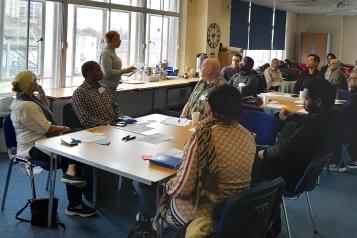Referrals black hole’ - new findings of people’s experiences of GP referrals

GP services are the first point of call for many health issues and the gateway to NHS specialist support.
GP teams are highly skilled and may decide that treatment without specialist care is the best action. But when you need specialist support, such as hospital tests or treatment, you may need a referral from your GP team first.
Our new research highlights that it can be very hard for some people to get a GP referral to another NHS service. And for 21% of people we spoke to, even when they get referrals, they can be lost, rejected or not followed up on.
When services don't process referrals properly, it can cause significant frustration, unnecessary anxiety, and even cause harm to patients.
It can also lead to increased demand for either more GP appointments or help from healthcare teams in other parts of the NHS, putting more pressure on already overstretched services.
'Referrals black hole'
We heard from 1,777* adults in England between September and October last year who had an experience of getting a GP referral within the previous 12 months. Of these, 368 (21%) fell into what we have called the "referrals black hole".
One in five respondents with an experience of a GP referral had fallen into the 'referrals black hole'.
We have defined people experiencing the referrals black hole as anyone who got a referral from their GP but then one of the following occurred:
- The GP practice did not send the referral
- The referral was sent, but the person received no communication about it
- The referral went missing between services
- The person was referred to the wrong service
- The hospital received the referral but declined it without telling the person.
- As a result, the person affected went back to their GP to chase up the referral.
The experience of failed referrals

Lauren's story: "I spend a lot of time chasing referrals."
Lauren, 37, is from West Sussex. The former nurse told us she spends a lot of time chasing GP referrals and puts regular reminders on her phone to contact her GP surgery and specialist wards at her local hospital.
Lauren was diagnosed with vestibular migraines and also has suffered from functional neurological disorder symptoms:
"I woke up one day and couldn't walk properly. I had a weird tingly sensation in my legs. My legs were very heavy. "
Lauren's symptoms are complex, and she needed multiple referrals over the years.
"Each time I get a referral from my GP it's a wait of six to eight months for my appointment."
After waiting six months, Lauren eventually had an appointment with the specialist. This led to another referral to a specialist physiotherapist. "The waiting times were unreal. I had to pay for private therapy instead. Luckily I have family who can support me to pay for treatment."
Lauren's healthcare journey has had a devastating impact on her day-to-day life and mental health. "I'm exhausted from dealing with it. I used to be a nurse, and I understand the healthcare system's pressures. But when you're living with symptoms, it's just dire.
"With the conditions I, and many others, have either the wrong type of specialist or service is selected by the GP so the referral is rejected or if accepted, an inadequate assessment and care may be provided with no ongoing treatment or review. I have experienced this with Neurology and Rheumatology and as a result am having to pay privately to access suitably knowledgeable specialists in these areas."
Louise Ansari, our National Director, said:
"The NHS knows a great deal about the difficulties people face getting a GP appointment and the current challenges with hospital waiting lists. But far less is known about people's experiences of getting a referral from the GP for more specialist care.
Thousands of people have told us that the process can be far from straightforward, with a shocking number of people telling us their referral wasn't sent, got lost, or was turned down by the hospital without anyone letting them know.
Falling into this 'referrals black hole' is not just frustrating for patients but ultimately means people end up going back to their GP or visiting crowded A&E departments to get the help they need. This adds more burden to already stretched services, making things even harder for the doctors and nurses trying to provide care.
Extra admin support must be put in place to improve referral processes and ensure that everyone who needs treatment can access it as quickly as possible, in the right setting and in a way that meets their needs."


